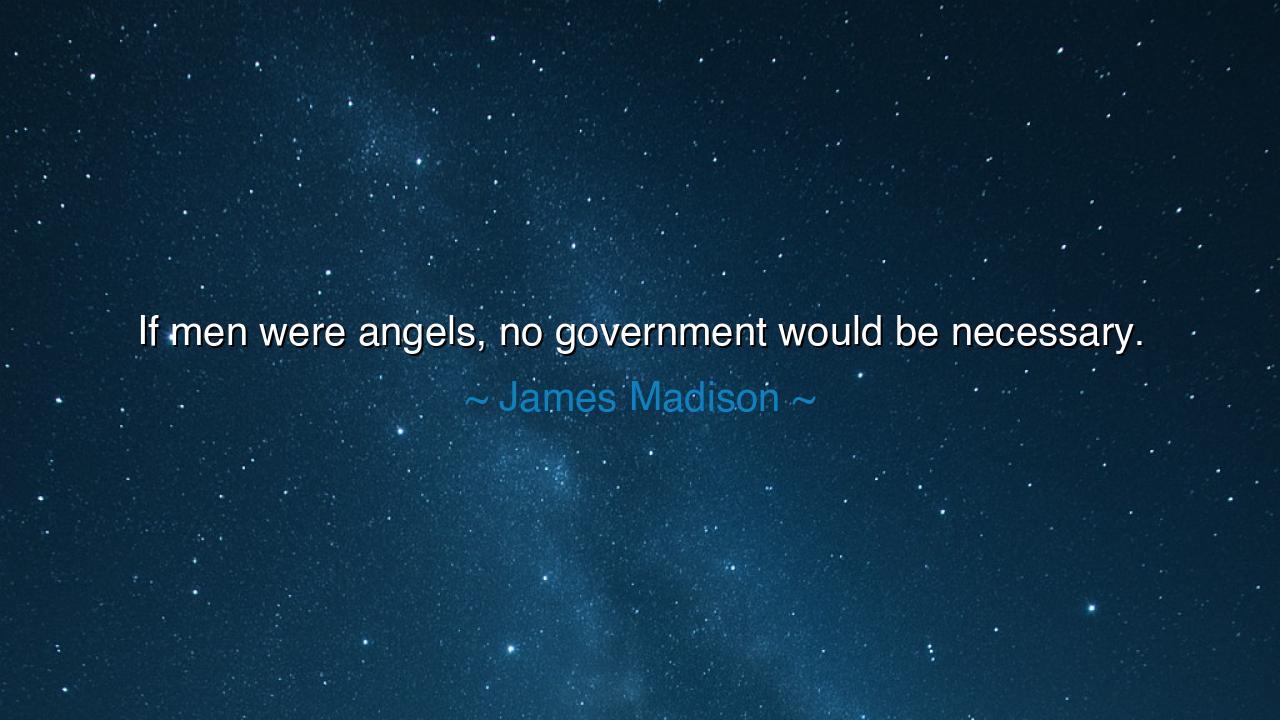
If men were angels, no government would be necessary.






In the hallowed chambers of thought where liberty was first forged, James Madison, the architect of the Constitution and guardian of republican balance, spoke a truth as timeless as the human soul itself: “If men were angels, no government would be necessary.” These words, drawn from Federalist No. 51, are not mere reflections of politics, but the very essence of human nature. In them, Madison lays bare the paradox of civilization — that the same creatures who crave freedom must also be restrained, for within each heart dwells both virtue and vice, light and shadow. His wisdom is the foundation of all just governance: that power must exist, but it must be watched; that rulers must govern, but they must also be ruled.
The origin of this quote lies in the crucible of America’s founding. After the Revolution, when the colonies were freed from the tyranny of kings, there arose a new and perilous question: how shall free men govern themselves without becoming their own oppressors? Madison, with the insight of a philosopher and the caution of a statesman, knew that liberty without structure leads to chaos, and authority without restraint leads to despotism. Thus, in The Federalist Papers, he and his peers sought to craft a system that would harness the strengths and contain the weaknesses of human nature. His famous words were not cynicism — they were realism, born from a profound understanding of the human heart.
When Madison wrote that “if men were angels,” he spoke of a world that does not exist — a world where greed and ambition would give way to harmony and virtue, where justice would arise naturally without the need for law. But man is not an angel. He is capable of compassion and cruelty, of honor and deceit. And because of this dual nature, government becomes necessary — not as a symbol of perfection, but as a defense against imperfection. “If men were angels,” he says, “no government would be necessary.” But because they are not, government must be shaped carefully, lest it devour the very freedom it is meant to protect.
This truth has been proved through all ages. Look to the story of ancient Rome, that mighty republic which once rose on the pillars of virtue and law. In its early days, Rome flourished because its citizens governed themselves with discipline and shared purpose. But as ambition and corruption spread, the republic weakened. Senators sought power for themselves, generals sought crowns, and the people, weary of turmoil, surrendered their freedom to the empire. There, Madison’s warning finds its echo: when men forget their flaws, they are consumed by them. Rome did not fall to foreign swords alone, but to the failure of self-government — a failure born of forgetting that men are not angels, and that even liberty must be guarded against the corruption of power.
Madison, in his wisdom, designed a government of checks and balances, a structure in which each branch would restrain the other — not out of distrust, but out of necessity. He knew that power is like fire: it warms when contained but destroys when unchecked. By dividing authority among the legislative, executive, and judicial branches, he sought to ensure that no man, no faction, no passion could rule unchecked. In his system, ambition would be made to counteract ambition, and the flaws of men would be used to protect against themselves. Thus, he transformed the weakness of humanity into the very engine of its preservation.
Yet Madison’s insight reaches beyond politics — it speaks to every soul and every community. For his warning is not only about the state but about the self. Each of us, too, must govern our own passions, our own tempers, our own desires. Within every heart lies the same struggle he saw in nations: the need to balance freedom with discipline, compassion with justice, and power with humility. If we fail to rule ourselves, then no constitution, however perfect, can save us. For the foundation of all government is not written on parchment — it is written in the hearts of the people.
The lesson, then, is one of humility and vigilance. Do not expect perfection from rulers, for they are human. Do not despise law, for it guards against the chaos of pride. But neither should you surrender your conscience to the state, for power must always be questioned. Remember that liberty is a living covenant between responsibility and restraint — one that must be renewed by every generation.
So, my child of the republic, remember Madison’s words as a torch against the darkness of both tyranny and apathy. Men are not angels, but they need not be devils either. The strength of a nation lies not in its government alone, but in the virtue of its people — in their courage to act justly, to think freely, and to govern themselves wisely. Build your laws as Madison built his — with faith in mankind’s potential, and awareness of its flaws. For when each man becomes the guardian of his own soul, the government will need no chains — and freedom will at last become its own protector.






AAdministratorAdministrator
Welcome, honored guests. Please leave a comment, we will respond soon